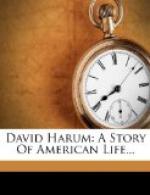“Perhaps you are right,” said John. “Indeed, I don’t doubt that you are right, and I will take your advice.”
“Thank you,” said David a minute or two later on, holding out the glass while John poured, “jest a wisdom toothful. I don’t set up to be no Sol’mon, an’ if you ever find out how I’m bettin’ on a race jest ‘copper’ me an’ you c’n wear di’monds, but I know when a hoss has stood too long in the barn as soon as the next man.”
It is possible that even Mr. Euston did not fully appreciate the difficulties of the task which he persuaded our friend John to undertake; and it is certain that had the latter known all that they were to be he would have hardened his heart against both the pleadings of the rector and the advice of David. His efforts were welcomed and seconded by Mr. Hubber the tenor, and Miss Knapp the organist, and there was some earnestness displayed at first by the ladies of the choir; but Mr. Little, the bass, proved a hopeless case, and John, wholly against his intentions, and his inclinations as well, had eventually to take over the basso’s duty altogether, as being the easiest way—in fact, the only way—to save his efforts from downright failure.
Without going in detail into the trials and tribulations incident to the bringing of the musical part of the service at Mr. Euston’s church up to a respectable if not a high standard, it may be said that with unremitting pains this end was accomplished, to the boundless relief and gratitude of that worthy gentleman, and to a good degree of the members of his congregation.
CHAPTER XXXIII.
On a fine Sunday in summer after the close of the service the exit of the congregation of St. James’s church presents an animated and inspiring spectacle. A good many well-dressed ladies of various ages, and not quite so many well-dressed men, mostly (as David would have put it) “runnin’ a little younger,” come from out the sacred edifice with an expression of relief easily changeable to something gayer. A few drive away in handsome equipages, but most prefer to walk, and there is usually a good deal of smiling talk in groups before parting, in which Mr. Euston likes to join. He leaves matters in the vestry to the care of old Barlow, the sexton, and makes, if one may be permitted the expression, “a quick change.”




